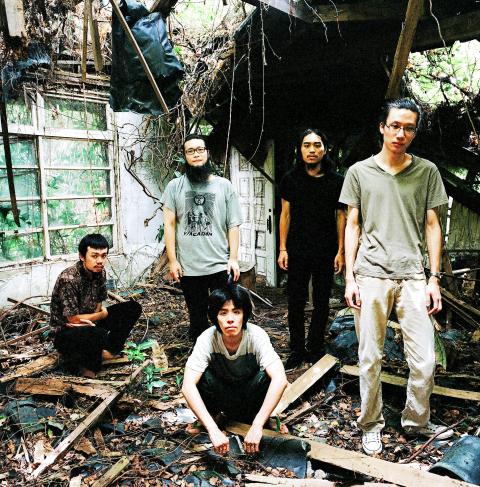For the last decade, Taipei’s punk scene has been pretty dead, while the metalheads have just cliquishly brooded in their own musical corner, kind of like they would at any high school. But then earlier this week, I got into a conversation with my Shida music dudes about how indie-rock kids are once again developing some creeping affections for hard, heavy, guitar-crunching bands. It might have to do with bombastic, high-energy shows by touring legends like Napalm Death, and it might also have to do with bands inching out of old genres and finding new cross-over crowds. That’s what seems to be happening with a new wave of bands, who are turning their backs on post-punk, postrock and shoegaze and instead making a conscious effort to look, act and sound “very rocker.”
Sleaze (湯湯水水) is one of the better bands in this growing scene, and they’ll release their first CD next Friday, Sept. 21 at Underworld, to be followed by three other shows through the end of the month. When I sat down with them earlier this week, the interview immediately turned into one of those interminable discussions of musical genre.
“Before, I listened to hardcore and screamo,” says Sleaze vocalist Norton Lin (林書緯). “Then I started listening to stoner [rock], and I really wanted to play stoner, but we weren’t really stoner. We were just some strange music, I don’t know what to call it.”

Photo courtesy of Sleazy
“I don’t really want to think about our band as being a certain genre,” he said. Then 10 minutes later, “I think Sleaze is a hardcore band.” And 20 minutes later, “If you have to say we’re some genre, say ‘psychedelic.’”
At this, guitarist King Kong Guan (官靖剛) started laughing. “Dude, we’re definitely not psychedelic. What, you think we’re Pink Floyd?”
“Oh,” said Lin. “Well then, maybe just forget about it.”
What they are is a group that started off in punk, hardcore and screamo. (Lin and Guan both loved the Japanese band Envy.) Three years ago, the different bands they were playing in broke up at around the same time. So they got together in 2009 and began by jamming off of heavy riffs, then followed those riffs into heavy grooves. Now, Sleaze forms its music around a core of extended jams that hearken back to late-70s hard rock, but they also weave in explosive punk riffs and spaced-out sections of bleary-eyed dub. There’s even the odd saxophone solo.
Lin also has a very interesting back-story, having started out as something of a child prodigy. Before the age of 10, his mother trained him to sing, dance and play the piano, before launching him into the world of TV singing competitions, including the most famous of the time, Wu Deng Jiang (五燈獎) (literally: Five Lights Awards). She also had him perform at weddings for NT$10,000 a pop. This is much less than he now makes delivering low, gutteral groans as lead singer of Sleaze. Still, he claims that the influence of Taiwanese pop singing legends like Wen Xia (文夏) and Liu Jia-chang (劉家昌) has not left him. And Guan, incredibly enough, claims that old pre-90s Mandopop influences his guitar arrangements. I will have to take their word for it.
■ Sleaze plays Fri, Sept. 21, 9pm at Underworld (地下社會), B1, 45 Shida Rd, Taipei City (台北市師大路45號B1). Admission: NT$300. They also play Sept. 22 at the Nangang Bottlecap Factory (南港瓶蓋工廠), Sept. 29 at Emerge Livehouse in Taichung (浮現藝文展演空間) and Sept. 30 at the Wall, Taipei.
In business news, Funky Brothers (放客兄弟) claims to be Taiwan’s first band to have used crowdfunding to raise money to produce an album. To thank their fans, they’ll play a free show at Revolver next Wednesday. Using the website FlyingV.cc, they raised NT$380,000 from 272 supporters, each of whom will get gifts — CDs, release party tickets and t-shirts — depending on the level of support.
Funky Brothers started five years ago as a four-piece, but has now expanded to become a 10-piece and one of Taiwan’s favorite party bands. Vocalist Airy Liu (劉怡伶) says there are now three very young crowdfunding websites in Taiwan. They chose crowdfunding after three years of failed applications for government recording subsidies, and she’s much happier with this solution.
“If we get money from the government, then finishing the album becomes just like finishing your homework. But if we get the money from our friends and our fans, it just makes more sense. In this case, we make the album for the people who want the music,” said Liu.
■ Funky Brothers play Revolver, 1-2, Roosevelt Rd Sec 1, Taipei City (台北市羅斯福路一段1-2號), near Chiang Kai-shek Memorial Hall MRT Station (中正紀念堂捷運站) Exit 4. Tel: (02) 3393-1678, on Sept 19 at 10pm. Admission is free.

Late last month Philippines Foreign Affairs Secretary Theresa Lazaro told the Philippine Senate that the nation has sufficient funds to evacuate the nearly 170,000 Filipino residents in Taiwan, 84 percent of whom are migrant workers, in the event of war. Agencies have been exploring evacuation scenarios since early this year, she said. She also observed that since the Philippines has only limited ships, the government is consulting security agencies for alternatives. Filipinos are a distant third in overall migrant worker population. Indonesia has over 248,000 workers, followed by roughly 240,000 Vietnamese. It should be noted that there are another 170,000

Hannah Liao (廖宸萱) recalls the harassment she experienced on dating apps, an experience that left her frightened and disgusted. “I’ve tried some voice-based dating apps,” the 30-year-old says. “Right away, some guys would say things like, ‘Wanna talk dirty?’ or ‘Wanna suck my d**k?’” she says. Liao’s story is not unique. Ministry of Health and Welfare statistics show a more than 50 percent rise in sexual assault cases related to online encounters over the past five years. In 2023 alone, women comprised 7,698 of the 9,413 reported victims. Faced with a dating landscape that can feel more predatory than promising, many in

“This is one of those rare bits of TikTok fitness advice with a lot of truth behind it,” says Bethan Crouse, performance nutritionist at Loughborough University. “Sometimes it’s taken a bit too literally, though! You see people chugging protein drinks as they’re scanning out of their gym.” Crouse recommends the athletes she works with consume 20-30g of protein within 30-60 minutes of finishing a resistance training session. “The act of exercising our muscles increases the breakdown of muscle proteins,” she says. “In order to restore, or hopefully improve them — and get gains such as increased muscle mass or strength —

“Far from being a rock or island … it turns out that the best metaphor to describe the human body is ‘sponge.’ We’re permeable,” write Rick Smith and Bruce Lourie in their book Slow Death By Rubber Duck: The Secret Danger of Everyday Things. While the permeability of our cells is key to being alive, it also means we absorb more potentially harmful substances than we realize. Studies have found a number of chemical residues in human breast milk, urine and water systems. Many of them are endocrine disruptors, which can interfere with the body’s natural hormones. “They can mimic, block